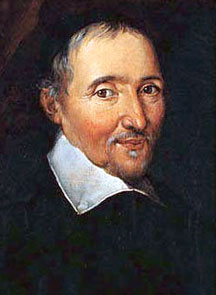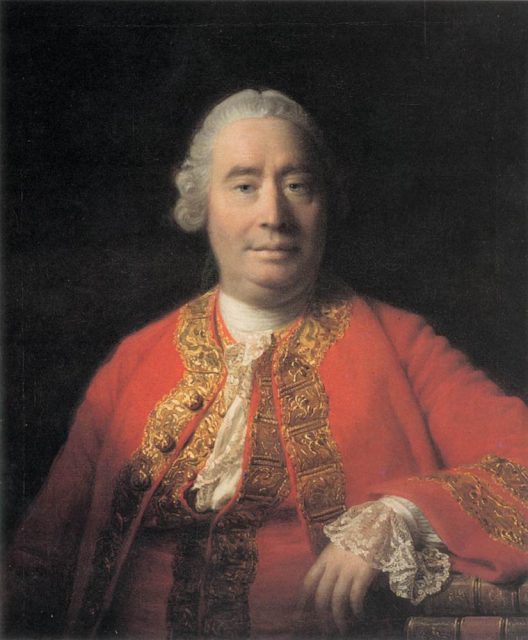Skepticism, a short uncertain history (6): The mother of all lost causes
Descartes’ opening of the Pandora’s box of skepticism, and the liberation of the Evil Demon it triggered, started a terrible shock in the tectonic plates of Western thought, a shock whose waves still reach us with more or less strength, and that mainly contributed to configure our contemporary intellectual landscape. I shall devote the next entry to narrate how post-Cartesian (from the Latin version of Descartes’ name: Cartesius) skepticism affected the status of religious beliefs, but in this one I will concentrate in how the Evil Demon managed to escape from Descartes’ (and a lot of other philosophers of the time) attempts to domesticate it and to persuade him to remain quiet and still in his corner of Pandora’s box.

It goes without saying that Descartes’ arguments in favour of the existence of god, of the reality of the things we ordinarily perceive, and of the existence and properties of our own minds were criticized from the beginning. On the one hand, most of the critiques from, so to say, official university positions pointed to the validity of his methods, in an attempt to save some types of ‘knowledge’ (either Aristotelian science or Christian faith) deemed to be important, but most of this I’ll leave it for the next entry. The other main group of strong opponents to Descartes’s was constituted by who later were identified as the empiricists, and, perhaps not as a coincidence, they tended to be not university professors, at least for most of their intellectually active life. These do not oppose so much to Descartes’ methodical doubt, but to his claims of being able of proving a lot of things thanks to it. Of course, there were other philosophers that agreed with the main Cartesian thesis and elaborated them in a more congenial way; these were later known as the rationalists (the main representatives being Spinoza and Leibniz).

Curiously, one of the first authors that offered an empiricist criticisim of Descartes’ ideas was a French priest (as well as mathematician, astronomer and physicist), Pierre Gassendi (1592-1655), in big part within the context of his attempt to use the empiricist and atomist views of Epicurus as a foundation of knowledge and make this compatible with the teachings and dogmas of the Church (in a similar way as Thomas of Aquinas had done with Aristotle in the middle ages). The English Thomas Hobbes offered also a similar critique during Descartes’ life, and in fact both criticism were included in the wide set of “Objections” (and replies) published in the second edition of Descartes’ Mediationes. Both Hobbes and Gassendi assert that the only reliable source of knowledge are the impressions of the senses, and the more or less uncertain comparisons and analogies that can be derived from them (Hobbes explicitly talked about computations, being the first author equating reasoning with computing, a topic later developed by Leibniz). The supposed “clear and distinct” ideas of Descartes are, says Gassendi, not so clear and distinct at all, and are susceptible to easy misinterpretations. In the line of classical skeptics, Gassendi also asserts that all conclusions derived from reasoning are less certain than the direct acquaintance of the senses, and they can give us not too much insight into the real nature of even the physical things (better available to experimental scrutiny), nor of more abstract entities like the mind or god. It is not strange that Gassendi were one of the first fans of Galileo’s experimental method, applying it to many areas in physics and chemistry, as well as a renowned astronomer of his time (he was the first one in creating a map of the moon). He, however, never explicitly accepted the Copernican model and even publicly defended the Church in the case of Galileo’s trial, though some of his biographers doubt whether his private opinion on the topic was different as the one he had to defend as a Catholic priest.

In one of the strangest twists of the history of philosophy, the dialectic of the discussion between Descartes, Gassendi and Hobbes led several decades later to a totally unexpected point of view. Traditionally, empiricism had been associated with materialism, so strongly that both terms could even have been considered as synonyms: after all, it is material things what we perceive with our senses, whereas ‘the objects of reason’ seem to be all of them utterly ‘immaterial’ entities. In spite of this, another priest, in this case the Anglican, Irish pastor Georges Berkeley (1685-1753), and later bishop of Cloyne, published when he was only 25 one of the strangest philosophical theories of all times. According to Berkeley, yes, it is through our senses that we gain all our knowledge of the world (and in this, he is utterly an empiricist), but all our knowledge consists of ideas (a term borrowed from Descartes himself), i.e., mental representations, which in the case of empirical perception are the colours, sounds, feelings of touch, etc., that we notice. The question Berkeley puts is, then, from where do we derive our notion of matter, or ‘material substance’ or ‘substrate’, that thing in which the perceived objects would consist in the end? According to Berkeley, we just do not have that idea, for the idea is itself a contradiction in terms: the idea (i.e., the mental representation, or ‘sensation’) of something that has properties that can be perceptually represented, but which in itself is not something perceptually representable, i.e., the idea of something of which there can be no idea (i.e., no perception). The only things we can conceive are, so to say, sensory qualities and, obviously, the minds that are having those sensations. To be (hence) is to be perceived, or to be a mind that perceives. Esse est percipi. Matter does not, cannot exist, for it corresponds to an internally inconsistent notion, and the only things that are real are our minds and their perceptions, and of course the mind that guarantees that everything is existing even when we do not perceive it: the mind of god, Who is permanently perceiving everything.
This theory was referred to as idealism (the opposite of materialism), and had later numerous sequels that fall outside the scope of my story. Berkeley was as far as to deny the existence of general concepts (what the hell is the general notion of a triangle, i.e., a triangle that is neither right, nor acute, nor obtuse?), as well as the consistency of Newton-Leibniz infinitesimal calculus, with arguments that, as we saw, were not convincingly contested till more than one century later. He also wrote on other stranger topics, like the nearly universal virtues of the infusion of tar (pine resin), a best-selling book of the time, or the convenience of baptizing slaves so that they obey their masters not only for fear of the whip, but for the fear of god (an argument developed in Bermuda when he spent there a couple of years trying to build a school for priests in the colonies).
But the philosopher who was to take the curse of the Evil Demon to its limits was, also in the 17th century, the Scotch David Hume (Edinburgh, 1711-1776), who also in his twenties published a book that went much further than that of Berkeley: the Treatise of Human Nature (1739), a work of which only a few samples were sold at the time, and that later he resumed and re-elaborated in a couple of shorter and much more popular works, in particular, for our topic, An Enquiry Concerning Human Understanding (1748), which, according to the modest author of this series, is the most important philosophical books of all times.

Hume is sympathetic to the spirit of the Berkeleyan criticism to the idea of matter: we just don’t have any idea at all of what an ‘imperceptible substratum’ of material things can be (though, of course, we may have the idea of objects so small that cannot be seen, like atoms, e.g., as far as we represent them through sensory ideas). But Hume claims that exactly the same can be asserted about the mind (or the soul, like was still typical to say): we don’t perceive our mind perceiving the sensory representations we see, we simply see those sensations; actually, it is an unjustified conclusion to say that I am perceiving a sensory idea; what the sensory experience directly shows is only itself, i.e., that some sensory experience (a colour, a sound…) is being real at this moment. Is there a subject ‘having’ that sensation? The idea of such a ‘subject’ is, for Hume, as dim as the idea of ‘material substrate’ was for Berkeley. The Cartesian sentence, “I think, therefore I am”, should be changed for something much more simpler, like “there is a thought now; full stop”.
But Hume went even much further. Both Cartesians and anti-Cartesians, even Berkeley himself, had used an almost unnoticed principle in order to conclude about the existence of almost everything whose existence they wanted to prove: the external world causing our sense impressions (let it be ‘material’ or ‘ideal’), our minds as the receptors of these impressions, and even god himself as the uncaused cause of everything else. I am referring, of course, to the principle of causality, according to which everything that happens must have a cause to happen. Hume asks what can be a demonstration of the validity of this principle. It cannot be a ‘truth of reason’ because, he says, we can conceive that something happens without a cause, and truths of reason are only those propositions whose negation is a contradiction, and hence, something impossible to conceive. Can we, then, know the truth of the principle by experience? This question led Hume to one of his most famous arguments: every time we derive a conclusion from experience (e.g., every time we make a generalisation, or a prediction), we are assuming that what we have not observed will follow the same regular connections we have actually observed; for example, we assume that the samples of water we have not seen heating till 100º C at normal pressure will transform in vapour when they do it.
Stated differently, we are assuming something even more abstract that the principle of causality, which is the principle of induction: if something has happened in some way every time we have observed it, it will happen in that same way every time simpliciter. But again, how can we demonstrate that this principle is valid? Like the principle of causality, it is not a truth of reason (we can conceive cases in which it fails; furthermore, if it were a truth of reason, why would we feel more certain that a generalisation is valid when we have observed it in lots of cases, than when we have observed just a few ones). Hence, can we demonstrate empirically that the principle of induction is valid? Not at all, again, for this would be a blatant petitio principii: “if the principle of induction has been observed to be valid in the cases we have observed it, then, by induction, we conclude that it will be valid in all cases”. Hence, the principle of induction is not a valid type of argument, nor can be used to prove that everything must have a cause. We are totally limited to the empirical regularities we have observed, and to our (felt) conjecture or expectation that these regularities are more or less permanent. But all our conjectures can possibly fail at some point, so there is, nor can there be, nothing as a ‘certain knowledge’ of the world, much less of all types of things that can neither directly nor indirectly be observed by us. We cannot even be sure of our memories, because our present experience of them is assumed to be an effect of past events (the facts we observed, and the fact that we observed them), and if the relation of cause-and-effect is not sure, who knows if there is a cause of our having memories now, or what that cause may be. In conclusion, what we call ‘knowledge’ is, rather, the custom or habit of expecting that the operations of nature are everywhere and every time as we think we have observed. No surprise that, after hours and hours speculating about these things, the only sensible reaction for Hume were to go out and play billiard with the friends for perhaps no less hours.
REFERENCES
Ariew, R., and M. Grene, 1995, Descartes and his contemporaries, Chicago, The University of Chicago Press.
Priest, S., 2007, The British empiricist, London, Routledge.
2 comments
[…] En esta sorprendente historia del escepticismo que está escribiendo Jesús Zamora el demonio de Descartes alcanza sus límites en Skepticism, a short uncertain history (6): The mother of all lost causes. […]
[…] [Esta é unha tradución adaptada do artigo orixinal de 7 de outubro de 2015 Skepticism, a short uncertain story (6): The mother of all lost causes, de Jesús Zamora Bonilla, que pode lerse nesta ligazón.] […]